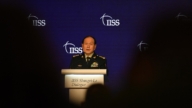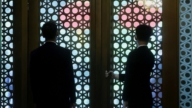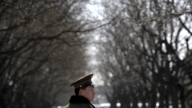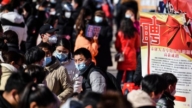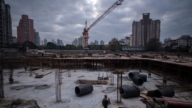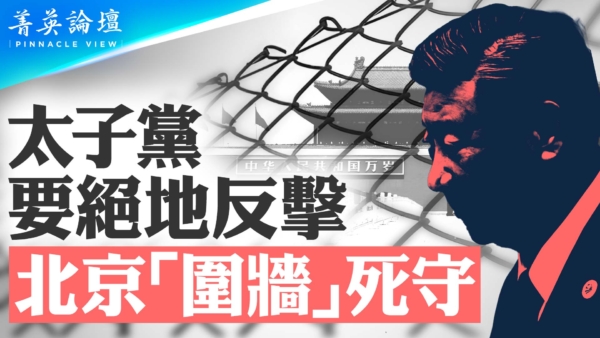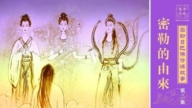【新唐人2014年02月08日訊】中共總書記習近平接班前夕,在「北戴河會議」上,與前任領導人達成共識,換屆後立即「收拾民心」。他強調,雖然內憂外患纏身,但「死穴」是失盡民心,隨時會面臨「中國版茉莉花革命」的危險,所以習上任後大力反腐倡廉。
2月4號,香港《經濟日報》引述一位曾參加2012年「北戴河會議」官員的話說,習近平在會議上強調,中共當前面臨的內憂外患與1948年的「國民黨」極為相似,處於「失盡民心」階段。
會議後,習近平與中共前領導人達成共識,決定十八大換屆後,儘快收拾民心。所以習近平上任後,拉開所謂的「反腐」序幕。
報導還引述北京觀察家的話指出,如何改變民眾對中共官員腐敗印象,習近平認為,扭轉公眾認知,需相當長時間,但是,時間不站在中共這邊。
北京時政觀察人士華頗:「說明中共對眼前的社會現狀和形勢是有清楚的認識的,因為江澤民執政13年,搞的腐敗政治,大力推行權貴經濟,壟斷經濟,搞的民不聊生,所以已經到了天怒人怨,已到非常危險的時刻了。」
前中共黨魁江澤民時代,特權橫行,腐敗成了中共核心的凝聚力,國有資源被幾大權力家族瓜分,江派勢力如曾慶紅、周永康等,成為中國社會巨貪家族。
北京憲政學者陳永苗認為,當下中共官場和1948年「國民黨」相比,腐敗的原因和背景還是有區別的。
北京憲政學者陳永苗:「1948年它的形勢不是因為它統治這麼糟糕,而是它打了10年的外仗,然後通貨膨脹,各種社會腐敗,都是跟打仗有關係,但是現在的中共有像48年的腐敗,它跟打外仗沒有關係,是因為它自己弄的糟糕。」
早在2011年,「英國皇家政治事務研究院」亞洲事務主管曾說,中共失去了中國99%人口的民心。對此,他們感到擔憂。
北京時政觀察人士華頗指出,這種狀況在「胡溫時代」已經非常明顯,可是他們有心無力,儘管溫家寶為收攏民心,無數次疾呼政治體制改革,但是實現不了。
華頗:「所以習近平要接掌江山的時候,他必須要有清楚的認識,所以他一上來,首先以反腐為突破口,大力打擊這些利益集團,阻礙改革的這些權貴們,所以暴露出來,春節(中國新年)期間中紀委沒有閒著,接連發文要繼續反腐敗。」
1月31號(大年初一),中央紀委監察部網站刊登消息說,南京市委原副書記兼市長季建業,涉貪被開除黨籍,並移送司法機關處理。
隔天的2月1號,中紀委監察部再發消息表示,要嚴厲懲處一切腐敗份子,加大國際追逃追贓力度,讓「腐敗份子無處藏身」。
2月2號,中共喉舌《新華社》報導說,審計署要求各級審計機關,嚴查濫用職權、貪污受賄等問題。
中共自「十八大」至今,反腐動作頻頻,一些官員因舉報落馬。但中國公民要求官員公示財產卻遭抓捕。「國際特赦」組織刊文批評中共為了維護政權、打壓異己,是「虛偽的反腐」。
華頗指出,中共的「反腐」,只是為了保共產黨江山的穩定。而要求財產公開的這些公民走向街頭,觸犯了中共大忌。
華頗:「因為中共對街頭政治談虎色變,所以中共認為,我是可以反腐敗,我可以去讓他們官員財產公開,但是你們卻不成,因為他們搞就會把局面搞亂了,所以習也會對民間健康力量進行打壓,因為他們要穩定局面,維穩還是第一位的。」
華頗表示,雖然中共這次破格大力反腐來收攏民心,但是中共多年來對民眾的血腥鎮壓,早已是民心向背。
採訪編輯/李韻 後製/李勇
The CCP attempted to win popular support by the anti-corruption movement
At the “Beidaihe Conference" prior to
the Chinese Communist Party (CCP) head Xi Jinping
taking power, Xi and other CCP leaders achieved
a consensus of immediately “winning the people’s support"
after he officially took the head position.
Xi emphasized, despite confronting
domestic and external troubles,
CCP’s “dead aperture" is losing people’s support,
which leads to the danger of
“Jasmine Revolution of Chinese Version" at any time.
So after Xi took the head position of the CCP,
he strongly launched the movement
of anti-corruption and building a clean government.
On February 4th,
Hong Kong-based Economics Daily Newspaper cites
an official who attended the CCP’s high-rank
Beidaihe Conference in 2012 and reports,
Xi Jinping emphasized in the Conference,
the domestic and external troubles the CCP is facing now
are very similar to the Kuomintang (KMT) in 1948,
which were all at a stage of losing people’s support.
During the conference, Xi Jinping achieved consensus
with the former CCP leaders, and decided to
win back people’s support as soon as possible
after the 18th CCP Congress.
So after Xi Jinping took the head position,
he launched the movement of anti-corruption.
The report cites a political observer in Beijing and points out,
as far as how to change people’s impression on
corrupt officials is concerned,
Xi Jinping says, to renew the people’s perception
about the CCP will take a considerably long time.
However, time does not wait for the CCP.
Beijing Political Commentator Hua Po: “This shows
the CCP has a clear realization
about current society’s status and situation.
During 13 years of holding power,
Jiang Zemin carried out policies of corruption politics,
cronyism and monopoly economics,
which made the people destitute.
So this has reached a very crucial point in time,
a very risky moment,
when the gods are angry and the people are resentful."
During Jiang Zemin’s time, the power of privilege is prevalent
and corruption becomes the cohesion of the CCP.
State-owned resources are partitioned
by several powerful families including Jiang’s faction figures
Zeng Qinghong and Zhou Yongkang
which leads their families to
become corrupted with a huge amount of money.
Bejing constitutional scholar Chen Yongmiao says,
compared with the KMT in 1949, the causes and background
of corruption in the CCP’s officialdom are quite different.
Chen Yongmiao: “the situation in 1948 resulted
from 10 years’ war against the Japanese,
which was enhanced with monetary inflation
and all sorts of social corruption.
However, the current CCP have a similar degree of corruption
but without external incentive.
It is the CCP themselves
that are responsible for the bad situation."
In 2011, the Chief of Asia Department of
“British Royal Politics Institute" said,
the CCP were losing 99% of Chinese people’s support
and they take the issue seriously.
Hua Po points out, such a status has been very obvious.
But they have the mind but without the strength to solve it.
Although Wen Jiabao called for
implementation of political reform
in order to win back the people’s support,
this was not realized.
Hua Po: “So when Xi Jinping took power,
he must have a clear understanding.
After he took power, he chose anti-corruption
as a breakthrough point, strongly hitting these interest groups
and the bigshots blocking reform.
During the Chinese New Year,
the Commission for Discipline Inspection of
the Central Committee of the CCP(CDICC)
continually published articles
advocating anti-corruption without stopping."
On January 31st (The first day of Chinese New Year),
the website of Supervision Ministry of CDICC
published a piece of news,
the deputy CCP head and the full mayor of Nanjing City
Ji Jianye’s case is transferred to the Justice Department
for processing and he was stripped of his CCP identity.
On the next day, the website of Supervision Ministry
of CDICC again published an article,
which spoke of punishing all corrupt officials
and enhancing the strength of pursuing and catching
corrupt officials who escape overseas,
which will make sure “corrupt officials
have no way of hiding themselves."
On the third day, the CCP’s mouthpiece Xinhua News Agency
reports, the Ministry of Auditing requires
each level’s audit departments to strictly investigate
the abuse of administrative power, corruption and bribery.
Since the 18th CCP Congress, the CCP implemented
many new anti-corruption measures
and some officials have fallen due to the reporting.
But Chinese citizens requesting official’s assets
be published are arrested. AMNESTY published articles
to criticize the CCP for “hypocritical anti-corruption"
which is focusing on extending the regime
and oppressing the dissidents.
Hua Po says, the CCP’s anti-corruption is only for
maintaining the CCP’s regime.
When these citizens walk on the streets for
publishing officials’ assets,
this offends the CCP most seriously.
Hua Po: “Because the CCP fears street politics extremely.
so the CCP says, we can oppose corruption
and ask officials to publish their assets, but you citizens
cannot because this will make the situation chaotic.
Xi』s authorities also oppress healthy civil forces
which maintain stability ,
the number 1 of all issues."
Hua Po says, although the CCP strongly
opposes corruption to win the people’s support,
the CCP’s bloody suppression of people
has caused the people to lose their support for the CCP.
Interview & Edit/LiYun Post-Production/LiYong


